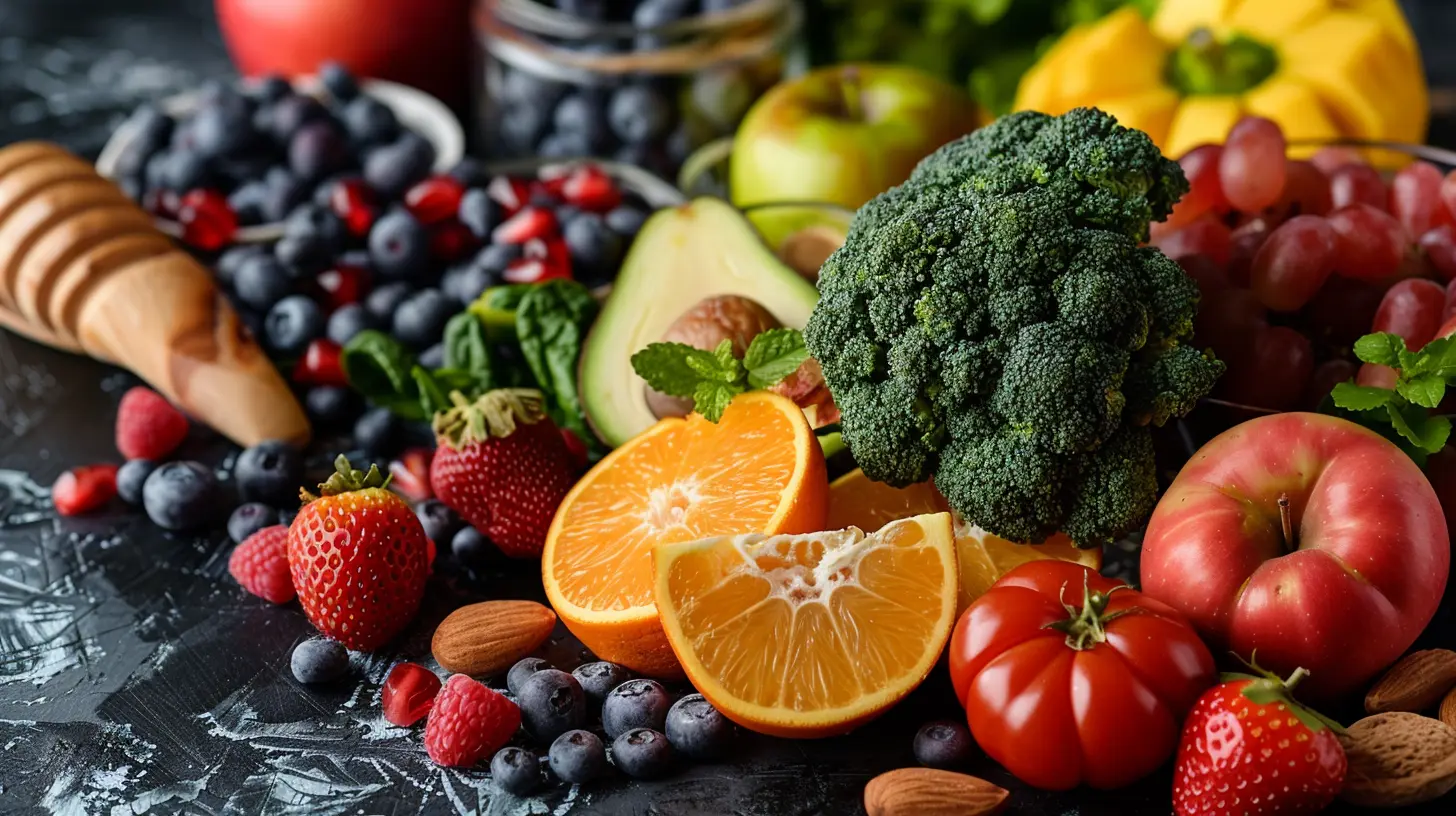16 April 2025
Ever find yourself feeling cranky or anxious after skipping a meal? Or maybe you've noticed how a sugar rush boosts your mood—only to come crashing down minutes later? Our emotions and what we eat are more connected than we often realize.
The truth is, what we put into our bodies directly affects how we feel. From regulating mood swings to reducing stress and anxiety, nutrition plays a massive role in emotional well-being. Let’s dive into the fascinating connection between food and feelings!

How Nutrition Affects Your Brain
Our brains are like high-performance engines—they need the right fuel to function properly. Every thought, emotion, and reaction is influenced by neurotransmitters, the brain's chemical messengers. These neurotransmitters, such as dopamine and serotonin, depend on the nutrients we consume.When we eat well-balanced, nutrient-dense foods, our brains work efficiently, helping us manage emotions better. But a poor diet? That can lead to mood swings, irritability, and even mental health issues over time.
The Gut-Brain Connection
Ever had a "gut feeling" about something? That’s because your belly is more than just a digestion center—it’s often called the "second brain." The gut and brain are constantly communicating through the gut-brain axis, a complex network of neurons, chemicals, and hormones.A healthy gut microbiome (the trillions of bacteria living in your intestines) supports better mood regulation. Foods rich in fiber, probiotics, and prebiotics help nourish this microbiome, keeping both your gut and mind happy. 
Key Nutrients That Influence Emotional Regulation
Not all foods affect emotions the same way. Some nutrients are absolute game-changers when it comes to mental well-being. Let’s break them down.1. Omega-3 Fatty Acids – The Brain Boosters
Omega-3s are essential fats found in fatty fish (like salmon and sardines), walnuts, and flaxseeds. These healthy fats improve brain function, reduce inflammation, and enhance emotional stability.Studies show that omega-3s help reduce symptoms of depression and anxiety. If your diet lacks these essential fats, you might experience brain fog, irritability, and mood swings.
2. Protein – The Building Block of Neurotransmitters
Proteins contain amino acids, which are crucial for producing dopamine and serotonin—the “feel-good” neurotransmitters. Foods like eggs, lean meats, lentils, and nuts provide these essential amino acids.When your diet lacks enough protein, it can result in low energy levels, difficulty concentrating, and a higher chance of mood imbalances.
3. Complex Carbohydrates – The Mood Stabilizers
Carbs often get a bad reputation, but not all of them are created equal. Simple carbs (like sugary snacks and white bread) lead to spikes and crashes in energy. In contrast, complex carbs (whole grains, beans, and vegetables) provide a steady release of glucose, keeping your mood stable.Serotonin, the "happiness hormone," relies on carbohydrates for production. So instead of avoiding carbs altogether, choose the right ones to keep your emotions in check.
4. B Vitamins – The Stress Fighters
B vitamins, especially B6, B9 (folate), and B12, support nerve function, improve energy levels, and help reduce stress. Deficiencies in B vitamins are linked to irritability, fatigue, and even depression.Foods rich in B vitamins include leafy greens, eggs, dairy products, and whole grains. If you’re feeling mentally drained and sluggish, you might not be getting enough of these essential nutrients.
5. Magnesium – The Calming Mineral
Magnesium helps regulate the nervous system and reduces stress hormones like cortisol. It’s found in foods like spinach, almonds, bananas, and dark chocolate (yes, you read that right—chocolate!).Low magnesium levels can lead to anxiety, irritability, and trouble sleeping. If you find yourself feeling on edge, you might just need more magnesium in your diet.
6. Probiotics – The Gut Healers
Fermented foods like yogurt, kimchi, sauerkraut, and kombucha contain probiotics, which support a healthy gut. A balanced gut microbiome improves serotonin production, helping regulate emotions and reduce anxiety.Gut health and mental health go hand in hand. When your digestive system is out of balance, your mood often follows suit. 
The Impact of Poor Nutrition on Mental Health
Now that we know what helps, let’s talk about what harms. A diet high in processed foods, sugar, and unhealthy fats can wreak havoc on your emotions.The Sugar Rollercoaster
Sugar may give you a temporary energy boost, but it comes with a steep price. After that initial rush, blood sugar levels drop rapidly, leading to mood swings, fatigue, and increased anxiety.Frequent sugar consumption has also been linked to higher rates of depression. So, while that candy bar might make you feel good for a moment, it’s not worth the emotional crash that follows.
Processed Foods and Mental Fog
Fast food, frozen meals, and processed snacks might be convenient, but they’re loaded with artificial additives, unhealthy fats, and excessive salt. These foods contribute to inflammation in the brain, making it harder to focus and regulate emotions.People who consume a diet high in processed foods often experience higher rates of depression, anxiety, and brain fog. Swapping out junk food for whole, nutrient-rich options can make a big difference in how you feel daily.
Caffeine and Alcohol – The Hidden Triggers
Caffeine might wake you up, but too much can heighten anxiety and disrupt sleep, leading to irritability. The same goes for alcohol—it may seem like it helps you unwind, but excessive drinking depletes essential nutrients and disrupts mood stability.Moderation is key. If you rely on caffeine or alcohol to cope with stress, consider swapping them for herbal teas or calming foods that naturally support emotional balance. 
Simple Changes for Better Emotional Regulation
Feeling overwhelmed? Don’t worry—you don’t need a complete diet overhaul overnight. Small, sustainable changes can make a big impact.1. Start Your Day with a Nutrient-Packed Breakfast
Skipping breakfast can lead to blood sugar dips and mood swings. Start with protein, healthy fats, and complex carbs—think eggs with whole-grain toast and avocado.2. Stay Hydrated
Dehydration can affect concentration, energy levels, and even mood. Aim for at least 8 glasses of water a day. Herbal teas and water-rich fruits like watermelon can also help.3. Cut Back on Processed Foods
Swap sugary snacks for whole foods like nuts, fruits, and dark chocolate. Your body—and your mind—will thank you.4. Eat More Mood-Boosting Foods
Add omega-3-rich fish, leafy greens, and probiotic foods to your meals. These small changes can improve emotional stability over time.5. Listen to Your Body
Cravings can be clues—some might signal nutrient deficiencies. Instead of reaching for junk food, ask yourself what your body truly needs.Final Thoughts
What you eat doesn’t just impact your body—it influences your emotions, too. A balanced diet filled with nutrient-dense foods can help regulate mood swings, reduce anxiety, and keep stress levels in check.So next time you’re feeling off, take a moment to reflect on what you’ve been eating. Simple dietary changes might just be the emotional reset you need!




Aisha Malone
Nutrition significantly impacts emotional well-being.
April 18, 2025 at 3:24 PM